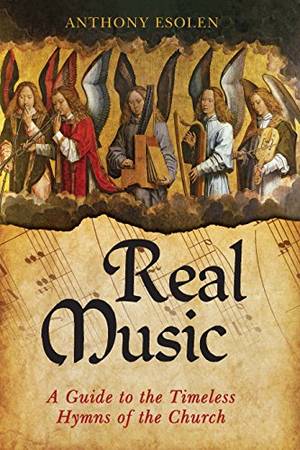
 HE TITLE of my current post comes from the first chapter of Anthony Esolen’s book on hymnody, Real Music (which can be purchased here). I was blessed to purchase the book as well as have a good conversation about it with the author himself last month and want to heartily recommend the, especially for the first chapter, which is devoted to the Psalter.
HE TITLE of my current post comes from the first chapter of Anthony Esolen’s book on hymnody, Real Music (which can be purchased here). I was blessed to purchase the book as well as have a good conversation about it with the author himself last month and want to heartily recommend the, especially for the first chapter, which is devoted to the Psalter.
The Psalter, as Esolen notes, is the prayer book of the Church and the Psalms constitute the “foundational poems of Christian praise.” Not only are the Psalms truly beautiful in an aesthetic sense (which they undoubtedly are), but also because they speak to every moment of the Christian’s life on earth—as well as the life to which he is called. They plumb the depths of joy, sorrow, praise, suffering, marriage, children, life, death, God and the fight between the family of God and its enemies. The Psalter was also the “hymnal” of Christ and Mary, the apostles and countless saints and sinners spanning the two millennia in the life of the Church. The only other hymnal that has come close to such longevity and vitality in the Roman Rite is the Graduale Romanum, another book of rare worth.
What I especially appreciate in his chapter on the Psalter is how Professor Esolen masterfully presents the reader with the beauty of the Hebrew Psalter and its idiosyncrasies, its structure and poetic styles, all without bogging the lay reader down with too many technical details of the Hebrew language. In a sense, he is able to bypass the trees and present the beauty of the forest. He also tackles the difficulty of not only translating the Psalter into English prose (he relies upon the beautiful King James version), but also the difficulty of creating metrical versions which live up to the majesty of the originals.
I do, however, want to caution the avid connoisseur of all things liturgical in the Roman Rite. This is not a work on the great hymns of the Divine Office or other liturgical chants that might be classified as hymns. Real Music deals with what one might classify as devotional hymns, which although not officially part of the Roman Liturgy, are nevertheless important to the flowering of true piety and love. Best of all, it comes with a CD containing a number of the hymns sung by the St. Cecilia Choir from St. John Cantius in Chicago. If you aren’t able to read music, just sing them with the CD until you know them by heart. I promise you, they will become a vibrant part of your spiritual life.

